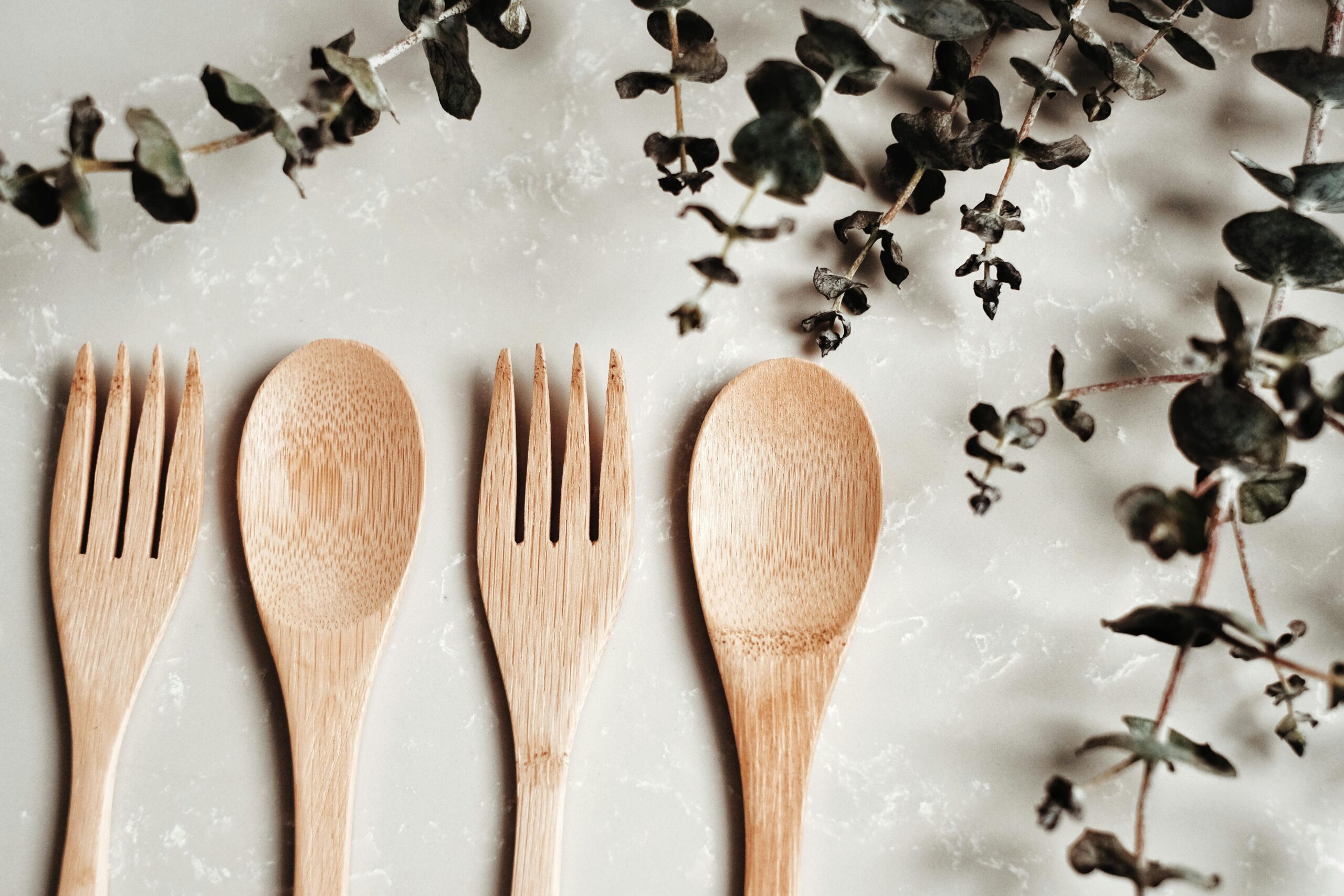Think of being in olive wood utensils possession of a kitchen tool that will be smooth, warm, and probably coming to life. That is the difference in how an olive wood utensil feels. No cold, hard metal or disposable plastic spoons which are in the short-term. These beauties are Olive trees which have been basking in decades of Mediterranean sunlight. When turned into spoons, spatulas or even forks they bring a bit of that eternal comfort and solid personality straight into your kitchen. And they are not mere tools, but heirloom-level stuff because using a spoon to stir a pot or tongs to serve a salad somehow feels a little bit special. When you take one in your hand you will immediately appreciate its weight and gorgeous grain, so everyday cooking becomes a silently happy experience.
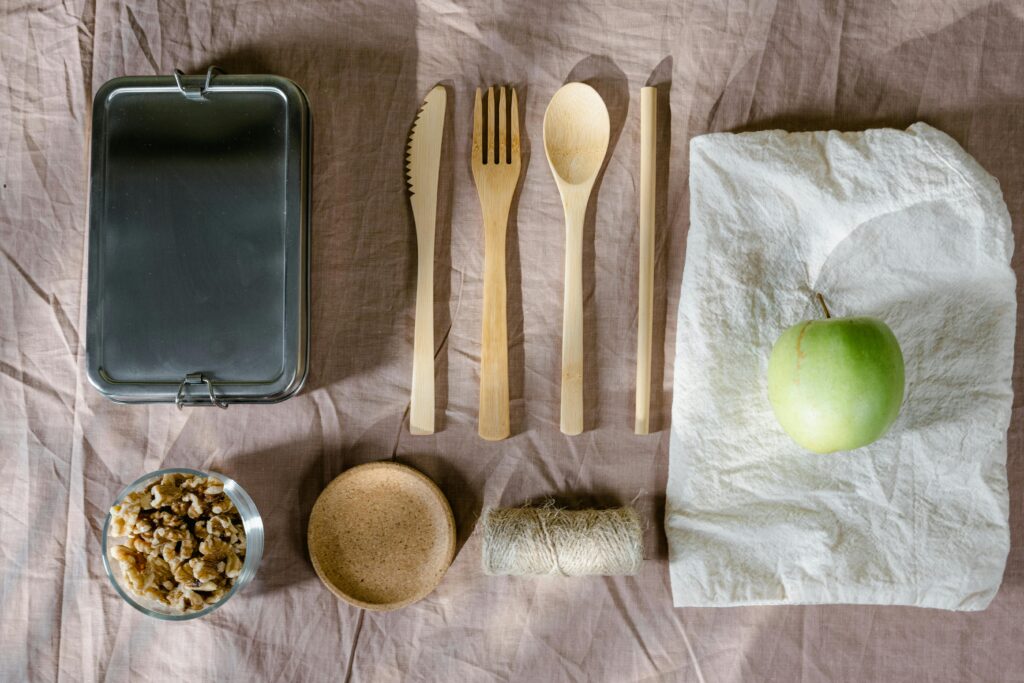
Discovering the Unique Charm of Olive Wood Kitchen Tools
What makes olive wood kitchen tools stand out starts with the wood itself. It’s often harvested from trees that have finished their main job of producing olives. This wonderful wood which is usually wasted gets a beautiful second life in your kitchen. You can be assured that when you receive olive wood it is indeed unique as opposed to the plastic or metal factory made items. And there are swirls, knots and deep colouring variations like honey, caramel and dark brown streaks, just take a good look. These are not defects, these are the part of history of the tree inscribed in the grain. The wood is surprisingly solid in your hand and at the same time, comfortable, and light. Better, olive wood is naturally dense. This implies that it will not absorb smells of strong food or have tastes like other woods do.
Why Olive Wood Cooking Utensils Are Naturally Tough Cookies
Don’t let the elegant look fool you – olive wood cooking utensils are incredibly tough. The secret is in how the tree grows. Olive trees mature slowly under the hot Mediterranean sun, often in challenging conditions. This slow growth creates wood with super dense, tight fibers packed closely together. This natural density is what gives your olive wood spoon or spatula its superpower: resistance. It resists scratches from your pots and pans. It resists dents if you give it a good stir. He it even resists warping or cracking when faced with heat or moisture, much better than many other woods. You won’t see it melt if it accidentally touches a hot pan edge like plastic might. And it’s gentle enough not to scratch up your favourite non-stick cookware or beautiful ceramic dishes.
Choosing Earth-Friendly Olive Wood Cutlery
An easy method in greening your kitchen is by choosing olive wood utensils. The majority of top olive wood products are the ones which are grown in trees that are either pruned or even taken away during the routine maintenance of the orchards. In many cases these are trees that go on later to have fewer olives. In that way the wood that goes to make your beautiful spoon is really a by-product of the current agriculture, and not an item brought about because somebody wanted to cut down a forest to have a spoon. When we select this renewable source, we will reduce our dependence on oil or metal-based plastics that require intensive mining practices. And, since olive wood utensils are very strongly-constructed and wear-resistant, they are in direct combat against the cult of disposable.e.
Easy Care for Your Olive Wood Kitchenware
Taking care of your olive wood kitchenware is refreshingly simple. Really, there’s just one golden rule: Hand wash only! Never, ever put these beauties in the dishwasher. The intense heat and harsh detergents are like kryptonite to wood – they dry it out terribly and can cause cracks and splits. Rather, simply wash your hands right after using them lightly with your hands. Apply warm, not hot, tap water, a drop or so of soft detergent and a softington. Stick them under clean water and rinse well. Then, this is key: dry them promptly and completely with a clean towel. Don’t let them sit wet! Give them a spa treatment about every couple of months or when they begin to look a bit dry or pale. Wipe them with a food safe mineral oil or a special wood conditioner.
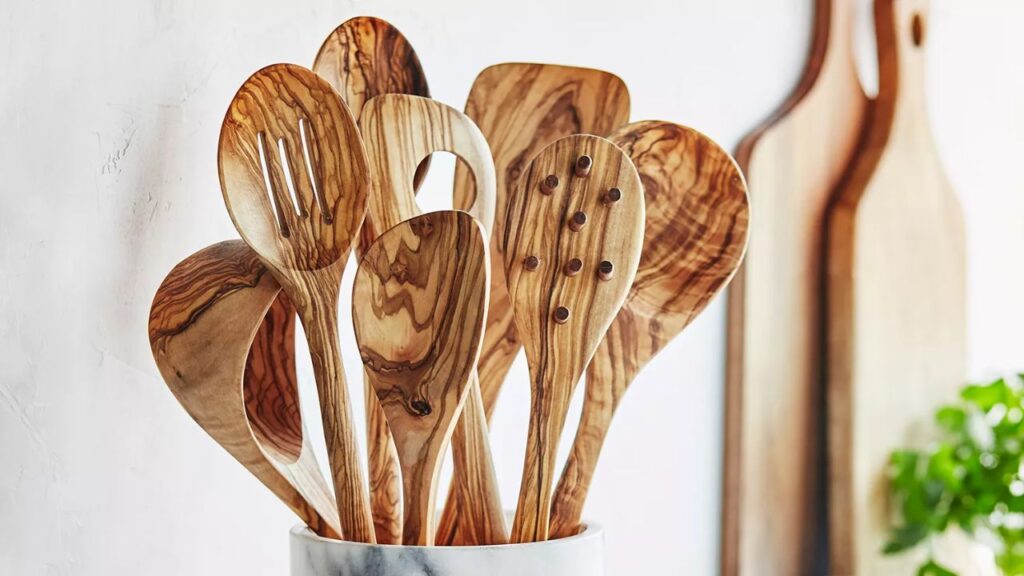
The Health and Safety Perks of Olive Wood Cooking Tools
Beyond looking great and lasting forever, olive wood cooking tools offer some real health advantages you’ll appreciate. That super tight, dense grain we talked about? It creates a surface that’s much less porous than many other woods or even plastic. Plastic can develop tiny scratches you can’t even see, perfect hiding spots for bacteria. Naturally, the density of the olive wood means that liquids, food particles, and germs do not get deep down the wood unlike in scratched plastic or more open grained woods. No porous object can ever be a hundred percent germ-proof, however, the nature of olive wood allows it to be a better hygienic option provided you keep it clean and dry after every use with proper cleaning and drying.
Styling Olive Wood Utensils in Any Kitchen
Think olive wood utensils only belong in a rustic farmhouse kitchen? Think again! Such beauties bring some organic warm touch to any style of kitchen. Be it a sleek modern kitchen, minimalist white kitchen, cozy, eclectic or all-out industrial chic, olive wood will blend in. The dark honey to deep caramel streaks of their natural color produce a spectacular auger. Just picture them contrasted with cool stainless steel appliances, or bright white subway tiles, or dark granite countertops. They bring life and texture. Don t cram them at the back of a drawer, but display them! The best cooking utensils should be sitting on your counter in an attractive crock or mounted on hooks in the vicinity of your range. An appetizing cake board made out of beautiful olive wood or a serving dish, will automatically make appetizers more special-looking.
Picking Your Perfect Olive Wood Utensils
Finding great olive wood utensils means keeping a few simple things in mind. First, pick them up! When you hold them they should be substantial, not thin, light, or fine. Give them a good look. Check the grain pattern – generally, tighter, more consistent grain means denser, more durable wood. Play with your fingers across the surface. It ought to be smooth as though there were no rough places, and no splinters. However, be very cautious of items which have been lacquered or varnished to a glossy finish, or suchlike covered in a plastic-like material; that could clog up the wood and stop it breathing naturally. The other factor to consider when buying wood is that reliable sellers will most likely state the wood is sustainably sourced, preferably pruned orchard trees. When the price looks too good to be true, then it is.
The Soul in Handmade Olive Wood Kitchen Pieces
There’s something special, a real soul, you can feel in handmade olive wood kitchen pieces that factory-made items just can’t match. The craftsmen usually carve such instruments manually and treat wooden materials. They look at the curves in nature, natural knots, grain direction in every special piece of wood. This hand crafting exercise enables the maker to reveal the natural strength and beauty of the wood in the most optimum manner with that particular piece. You may find a handle shaped exactly to fit your hand, or how a part of the tree, shaped naturally by a twist of the wood, has been turned into the piece, so that it is an ornament, and not a blemish. Choosing handmade supports these traditional woodworking skills. It also means you own something truly individual.
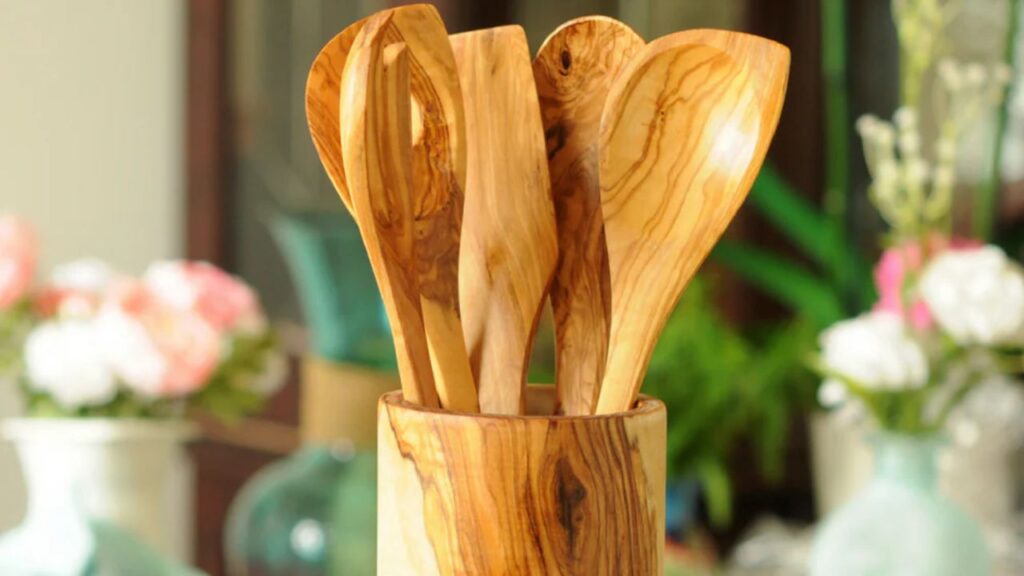
Gifting the Warmth of Olive Wood Utensil Sets
Want a gift that is pretty, but is actually useful? The best thing is an olive wood utensil set. It’s perfect for housewarmings, weddings, holidays, birthdays – almost any occasion! It’s a present that combines practical, everyday usefulness with undeniable beauty and a nod to being eco-friendly. Think about a beautifully presented olive wood cheese board with a matching knife – instant charcuterie upgrade! Or elegant olive wood salad servers that make tossing greens feel fancy. Or a collection of essential cooking spoons and spatulas that will be used constantly. The natural warmth and timeless style of olive wood means it suits almost anyone’s taste or kitchen décor.
Difference Table
| Feature | Plastic Utensils | Metal Utensils | Olive Wood Utensils | Why Olive Wood Wins 🏆 |
| Feel & Comfort | Lightweight, can feel cheap | Cold, hard, noisy | Warm, smooth, comfortable grip | Feels naturally warm and substantial in hand – no cold shock or clanging. |
| Durability | Melt/deform with heat | Dent pans, conduct heat | Naturally hard, heat-resistant | Won’t melt or warp. Gentle on cookware. Lasts decades with care. |
| Kitchen Safety | Can leach chemicals when hot | Scratch non-stick surfaces | Non-toxic, non-scratching | Safe for all cookware. No chemicals – just natural wood. |
| Eco-Impact | Made from oil, landfill-bound | Energy-intensive mining | Renewable byproduct (pruned trees) | Uses wood from sustainable orchard upkeep. Biodegradable. |
| Maintenance | Dishwasher “safe” (but degrades) | Dishwasher safe | Hand wash + occasional oiling | Simple care = decades of use. Develops beautiful patina over time. ✨ |
| Hygiene | Scratches harbor bacteria | Naturally non-porous | Dense grain resists bacteria | Tighter grain than most woods = less odor/bacteria absorption when cleaned properly. |
| Aging | Fade, crack, become brittle | Rust or tarnish | Gets richer & more beautiful | Develops a unique, deep patina – tells your kitchen’s story. |
| Value | Cheap (replace often) | Mid-range | Higher upfront, lifelong value | An heirloom piece. Saves money long-term vs. replacing plastic constantly. |
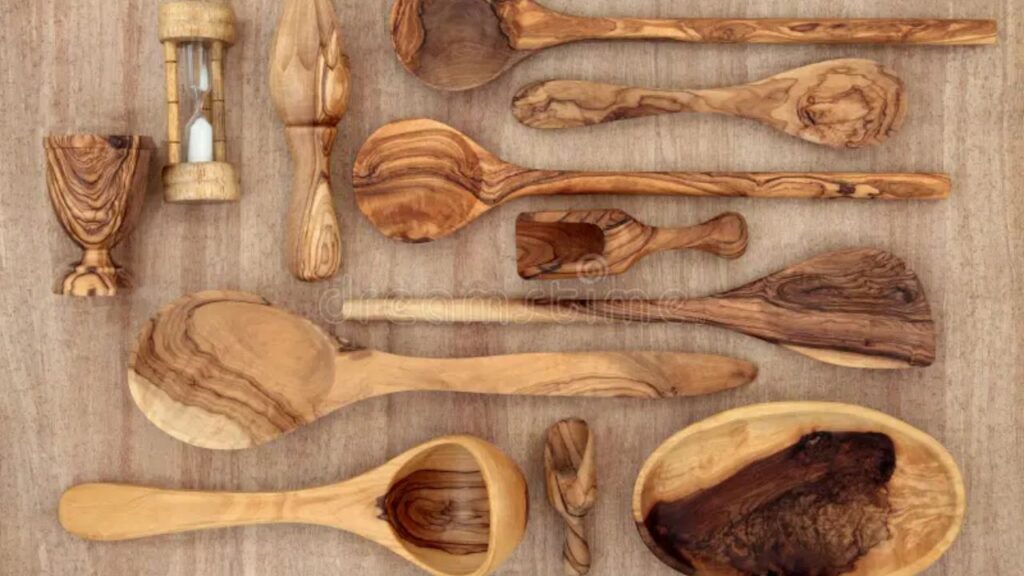
Why Olive Wood Belongs in Your Kitchen for Good
Bringing olive wood utensils into your kitchen is truly an investment. It is an investment into long-term beauty, into greener decisions, and into equipment designed to work decade after decade. They are like ancient trees brought to life through carving or planning skills, they have a character and quality that is hard to match because of the combination of natural beauty and individual marks and wear, and safety and subtle practicality. They repel the scratch, tolerate heavy odours, and over a few basic hand washings and every so nonchalant oiling, will last you many decades of service. The do not get worn out as they get older; they gain more and more character, developing a deep character which speaks more about all your cooking experiences. Olive wood selected will be a step towards getting out of the cycle of purchasing cheap, breaking and replacing. It means embracing beautiful, renewable materials.
FAQs
1. Can I put my olive wood utensils in the dishwasher?
No, it is definitely a hand wash! The tough dry heat in the dishwasher and detergents crack up the wood. They can be left spotless with a little wash in mild soap, warm water and a soft cloth then thoroughly dried.
2. Is olive wood really eco-friendly?
Yes! Most high-quality olive wood items are created from trees that are trimmed as part of normal orchard care. These trees are usually older and produce fewer olives. This is a wonderful choice for a renewable resource because it employs a natural byproduct instead of cutting down trees simply for wood.
3. Why choose olive wood over plastic or metal?
Olive wood is warm, beautiful, and long-lasting. It feels good in your hand, won’t scratch pans, doesn’t soak up scents, and gets better looking with time. Also, it’s better for the environment than plastic and softer on cookware than metal.
4. Do olive wood utensils really get better with age?
Absolutely! They look better with just a little maintenance, like washing your hands and oiling them now and then. The wood naturally gets a deeper, richer patina—a warm, smooth shine—that tells the tale of all the meals you’ve made together, making them feel like good friends.
5. Are olive wood utensils safe and hygienic?
Yes, they are a good pick. Because the wood has a very deep grain, it is naturally less porous than many other woods or scratched plastic. This means that it is better at not soaking up bacteria and smells when it is cleaned and dried correctly after use. Also, it’s not hazardous or harmful to the environment, unlike some plastics.
